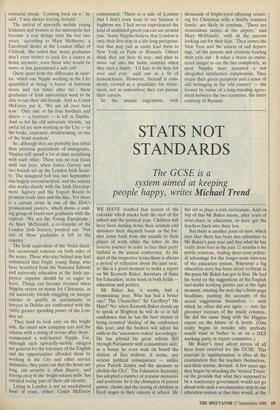STATS NOT STANDARDS
The GCSE is a system aimed at keeping
people happy, writes Michael Trend WE HAVE reached that season of the calendar which marks both the start of the school and the political year. Children will have been dusting down their satchels and ministers their dispatch boxes as the for- mer come back from the seaside to their places of work while the latter do the , reverse journey in order to face their party faithful at the annual conference. At the start of the respective terms there is always a period of reflection about the past year, so this is a good moment to make a report on Mr Kenneth Baker, Secretary of State for Education, in his work in both fields education and politics.
Mr Baker has, it seems, had a tremendous year. Who has had a better one? The Chancellor? Sir Geoffrey? Mr Hurd? No; when Kenneth Baker stands up to speak at Brighton he will do so in full confidence that he has the best chance of being crowned 'darling' of the conference this year; and the bookies will adjust his odds in the 'succession stakes' accordingly. He has piloted his great reform Bill through Parliament with consummate skill; as a bonus he even took on board the abition of Ilea without, it seems, any serious political consequence — unlike poor Patrick Jenkin and the measure to abolish the GLC. The Education Secretary has adopted a number of popular measures and positions: he is the champion of parent power, choice and the testing of children at fixed stages in their careers at school. He has set in place a core curriculum. And on top of this Mr Baker seems, after years of near-chaos in education, to have got the teachers back into their box.
But there is another point of view, which says that there has been less substance to Mr Baker's .past year and that what he has really done best in the past 12 months is his public relations, trading short-term politic- al advantage for the longer-term interests of the education system. Wherever a big education story has been about to break in the press Mr Baker has got in first. He had his word on the suggestions of the English and maths working parties just at the right moment, stealing the next day's front-page headlines, pushing the accounts of the actual suggestions themselves — with which he often did not agree — into the gloomier recesses of the inside columns. He did the same thing with the Higgins report on the future of A levels. (One really begins to wonder why anybody would want to bother to sit on a DES working party or report committee.) Mr Baker's most adroit moves of all have been reserved for the GCSE. This exercise in 'egalitarianism' is after all the examination that the teachers themselves, and their unions, devised. A few years ago they began by attacking the 'wicked Tories' on the grounds that what they supposed to be a reactionary government would not go ahead with such a revolutionary step in our education system or that they would, at the least, drag their feet. Baker swept past them and pushed on with the new exam to such an extent that the teachers changed their cry to — 'slow down, slow down'.
In particular Kenneth Baker has done well with the recently announced results of the GCSE. They purported to show that standards have actually 'improved'. Every- body heaved a sigh of relief — DES; teachers, parents and children. All, that is, except the Guardian, acting one might think as a long-stop for the teaching unions. This paper told us (from, apparent- ly, a 'leaky' GCSE chief examiner) that there was an element of 'fix' in the results. Political sour grapes, you might think? Trying to suggest that Wonderboy Baker has after all made a frightful hash of it.
It would, however, be a great mistake to allow the only dissenting voice to come from the interest groups the Guardian represents. The GCSE results beg a num- ber of very important questions which must not be swept aside by the Secretary of State's triumphal progress. The suggestion of a fix is one that must be treated seriously because, as anybody who has ever marked papers will know, the setting of grades for every examination has, of necessity, some- thing of a fix about it, and even more so when — like the GCSE it is a completely new examination. We are told that an average 8.6 per cent gained top grades this year compared to 6.8 per cent at 0 level last year. What does this mean? The second figure could as easily have been arrived at by reversing the first by a stroke of the pen as by any other way. How, in any case, can anyone legitimately compare the results of the GCSE with those of last year's 0 levels and CSE when the whole purpose of the exercise was to put an end to comparisons of this and other types considered to be odious, elitist and unfair? The talk about maintaining and improving `standards' is, therefore, pretty meaning- less. One school that did enter pupils for both exams (in History) simultaneously GCSE and the still surviving Scottish 0 level — was Lewes Priory in East Sussex: Mr Chris McGovern, the head of history, reported that the GCSE grades were 'in- credibly erratic', with the marks of the same children in the two exams failing to match in 17 out of 26 cases.
What of the details of the GCSE result themselves? The examiners thought it par- ticularly worthy of mention that Chemistry and French had improved. But, following this line of argument, what should we make of the lower percentage of A grades in English and Maths — the central two parts of the core curriculum? Does this mean that here there has been — even by the GCSE's means of measuring — a drop in standards? If so then this is a very serious problem. Little, however, has been made of this by the education authorities. Listen, rather, to the unctuous words of the GCSE Joint Council in their response to the results of their new examination: `there is strong evidence that the courses for GCSE have increased the motivation of candidates and have proved to be more enjoyable'.
Mr Baker and his GCSE bed-fellows have got off very lightly so far. But that, it seems, is due to their 'presentational skills', to use the new language of educa- tion. This can be seen from another 'leak', or as the newspaper in question on this occasion put it — 'a confidential minute from the Department of Education and Science disclosed to the Times'. In late April it seems the DES and its Ministers were bracing themselves for a wave of criticism over the GCSE examinations. There were suggestions that 'positive noises' should be made about the good standard of examination papers. Accord- ing to the account in the Times both officials and examination chiefs were 'in- structed . . . to join forces . . . to mount a propaganda offensive aimed at maintaining public confidence in the replacement for 0 levels'. Moreover, 'a detailed campaign strategy aimed at reassuring parents and pupils about the standards' of the new examination had been drawn up within the DES — this some three or four months before the results were even arrived at.
The DES strategy has worked all too well. We are now reaching the end stages of the whole procedure, having just heard that in Northern Ireland the number of appeals against GCSE results are signifi- cantly down on last year's against 0 level and CSE decisions (the pattern for Eng- land and Wales will surely follow that of the Province). What nonsense this all is. While these figures are being presented as proof positive that the GCSE is giving `parental satisfaction', all they really show is that if you hand out 'good' grades you get happy pupils — and happy parents.
The real test of the GCSE will not come from all those immediately involved being satisfied with a system that was specifically designed to make them happy. The whole PR presentation of the results has been disingenuous, for the GCSE was expressly designed to give 'prizes to everyone' — not just the candidates, but also the teachers, schools, DES and most particularly the Secretary of State himself.
But what will the universities and em- ployers make of all this, of an examination that sets out to test 'attitudes' rather than excellence? How will they know if the young people they see have been properly stretched to show their real potential? Now we will have to fend off the ever-growing assault on the A level system for which the new GCSE is a hopelessly inadequate preparation. More and more voices are being raised to argue that A levels should be dragged down to meet the new GCSE. There is every reason to think that if the DES can get away with smoothing things over in this the first year, things will quickly get worse in the years ahead.



































































 Previous page
Previous page